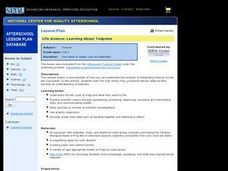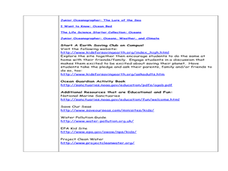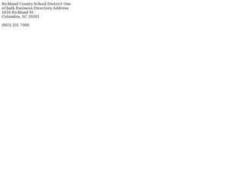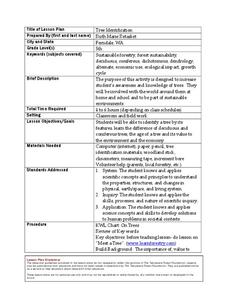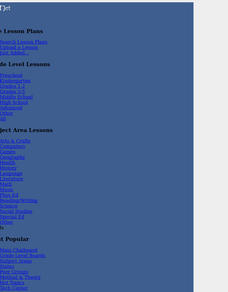Curated OER
The Water Cycle (Evaporation, Condensation, Precipitation)
The 3 steps of the water cycle, evaporation, condensation, and precipitation, are the focus of this lesson. After a neat demonstration of rain using hot water, a pie tin, and ice cubes, young scientists observe and discuss the elements...
PBS
Water Cycle and Watersheds: Ways of Watersheds | UNC-TV Science
Take a field trip with water as it moves on and below Earth's surface. Investigators discover the link between water and land in the water cycle and the importance of watersheds while viewing an animated video. Scholars test their...
Virginia Department of Education
The Hydrologic Cycle
There is the same amount of water on earth now as there was when it was formed. The water from your faucet could contain molecules that dinosaurs drank! Young scientists build their own hydrologic cycle model and observe it for five...
Curated OER
The Water Cycle
Third graders investigate water formations by conducting an experiment. In this water properties lesson, 3rd graders utilize pie tins, sponges and salt shakers to create an evaporation and saturation experiment. Students collaborate in...
Curated OER
Importance of Water
Students complete a KWL chart on what they comprehend about water. They complete a water activity determining how much usable water is available, and they determine the water usage in their households. Students take notes on water and...
Curated OER
Water: Our Most Important Beverage
Third graders create a KWL chart about water. In this environmental science activity, 3rd graders demonstrate how much water on Earth is usable. They act out the different stages of the water cycle.
Curated OER
The Water Cycle and Clementine
Third graders sing a piggyback song to explore the parts of the water cycle and then illustrate and label the water cycle in their science journals.
Curated OER
Water: Our Most Important Beverage
Third graders complete a KWL chart on what they already know about water and what they want to know. As a class, they participate in an activity in which they discover the amount of drinkable water on Earth and are introduced to the...
Curated OER
Life Science- Learning About Tadpoles
Learners investigate a frog's life cycle. In this tadpole instructional activity, students observe tadpoles in an aquarium and record results. Learners fill in a KWL chart as an assessment.
Curated OER
I Can Preserve My Planet
Students explore renewable and nonrenewable resources. In this ocean preservation lesson, students use KWL charts to understand ways the ocean is important to our daily lives. Students create a poster or wirte a letter to someone...
Curated OER
Water Properties of the Great Salt Lake
Fourth graders examine the ecosystem of the Great Salt Lake in this two-part lesson, completing a KWL chart before and after the field trip to the site. While there, they draw and write about their observations. To test for buoyancy,...
Serendip
Using Models to Understand Cellular Respiration
Energize biologists with colorful images in an activity that captivates the imagination while demystifying the subject of cellular respiration. Participants build comprehension skills and access core content knowledge by analyzing text...
Curated OER
Observing Weather
Students investigate the weather by reading children stories. In this weather observation lesson, students read Cloudy With a Chance of Meatballs and several other stories about weather before they create a KWL chart. Students utilize...
Curated OER
Ecosystems Beneath the Surface
Sixth graders create a KWL chart about microorganisms. In this biology activity, 6th graders create and label a diagram on a microbial mat. They investigate the processes involved in the carbon, oxygen and sulfur cycles.
Curated OER
Something's Fishy
Students study fish habits and traits. In this marine life lesson, students complete four learning centers of a fish memory game, a fish habitat study, draw and glue fish craft activity, and a fish read-a-thon. Students complete their...
Curated OER
Coral Reef Ecology
Students explore coral life cycles. In this coral ecosystems lesson, students view videos explaining the life cycle of coral, including examples of sexual and asexual reproduction. Students read a related article cooperatively in groups,...
Curated OER
Flower Reproduction
Fifth graders examine the cycle of flower reproduction. They listen to a poem about a bee, observe and examine flowers in small groups, and develop a class KWL chart. Students then read about flower reproduction in their textbook, and...
Curated OER
The Air We Have Around Us
Students listen to story, The Lorax, by Dr. Seuss, discuss air quality and how people affect the earth and its atmospheric cycles, and give oral reports on what they have learned.
Curated OER
Do You See What I See?
Second graders view a teacher-created terrarium, and complete a KWL chart. They discuss what they can see, Students go on a nature walk and compare the schoolyard to the terrarium, discussing the roles of rocks, plants, soil, and water...
Curated OER
Tree Identification
Learners list four ways to identify trees. In this tree identification instructional activity, students use tree identification techniques such as leafs, bark, wood grain, soil type, and climate to create tables and graphs.
Curated OER
Clouds
Students study how to use the Internet as a static information collection tool, to enhance the literature stories on the weather and study how to use the calculator.










